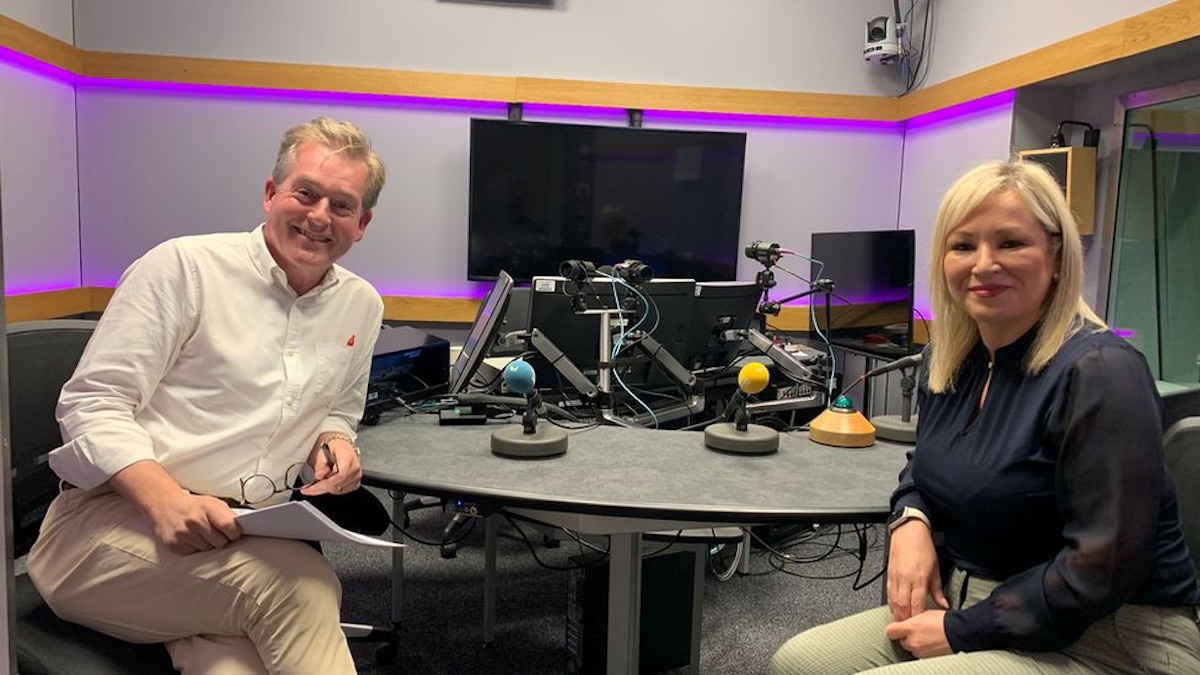
Amid increased public interest following her historic election as Sinn Fein’s First Minister-designate, Michelle O’Neill has been extensively interviewed about her life and influences.
The Mid Ulster Assembly member, who was born in 1977, spoke to the BBC’s Mark Carruthers about her time at school in the 1980s and 1990s, and how she devoted herself to the peace process at the age of 21 when the Good Friday Agreement was signed.
She recalled how her interest in politics developed. Her father, Brendan Doris, was a Sinn Féin councillor and former political prisoner.
“We wouldn’t have been a house that sat down at the kitchen table to talk about politics every day,” she said.
“However, some of it was a little unavoidable because of the fact that my father was a Sinn Féin councillor, the fact that previous to that he was an ex-prisoner.”
She said that it was the “extraordinary circumstances” of the society around her that shaped her political beliefs.
“You’re born into a society that actively discriminated against you,” she said.
“I remember getting my driving lessons and I remember being stopped by the local RUC.
“They actually gave me, I’m not sure it was a fixed penalty notice then or a fine, for not wearing a seatbelt whenever I was wearing a seatbelt.
“The words of those officers to me were: “Well it will be your word against ours, and we know who’s going to come out on top of that.”
“So that’s the active discrimination that you lived in in society at those times.
“It sounds quite trivial in terms of what happened in the conflict, but that’s my experience of something actually happening personally to me, outside of everything else that was happening at that time.”
When asked about the descent into conflict in the 1970s and the Provisional IRA’s armed struggle, Ms O’Neill replied: “I don’t think any Irish person ever woke up one morning and thought that conflict was a good idea, but the war came to Ireland.
“I think at the time there was no alternative, but now, thankfully, we have an alternative to conflict and that’s the Good Friday Agreement, and that’s why it’s so precious to us all. My whole adult life has been building the peace process.”
She added: “I wish the conditions were never here that actually led to conflict. I wish that so many people didn’t have the horrible experience that they’ve had throughout the conflict days.
“I think the only way that we’re ever going to build a better future is to understand that it’s okay to have a different take on the past.
“My narrative is a very different one to someone who has perhaps lost a loved one at the hands of republicans, so I think that we need to be mature enough to say, that’s okay, we’ll have to agree to differ on that one but let’s make sure the conditions never exist again that we find ourselves in that scenario.”
She paid tribute to Martin McGuinness and revealed the degree to which the late Sinn Fein Deputy First Minister shaped her politics.
“I was lucky to have his tutelage for many, many years. He was a huge influence in my life,” she said.
She confirmed she had been hand-picked by him to become his successor as a “safe pair of hands” after it emerged he had a fatal illness in 2017. She defended his controversial engagements with the British royal family as the “right thing to do”.
‘PRAYED OVER’
Recalling her upbringing and her time at school in the 1980s and 1990s, she revealed that she was “prayed over” at her school when she became pregnant at the age of 16.
She said that the school, St Patrick’s Girls’ Academy in Dungannon, County Tyrone, created a “huge fuss” when she returned to study for A-level exams after her daughter was born.
Ms O’Neill said her form teacher at the time of her pregnancy “was absolutely amazing to me and very understanding that you’re not like every other 16-year-old”.
“You’re trying to do your GCSEs maybe having been up all night the night before with a child with a sore ear,” she added.
“Unfortunately my reality was that not everybody in the school was as supportive. It was a Catholic grammar [school]. A 16-year-old girl being pregnant was frowned upon and they wouldn’t have been the kindest in terms of their approach to supporting me at that time.”
Ms O’Neill said that despite her daughter being born six days before her first GCSE exam, she was determined to sit them as she wanted to return to study for A-levels.
“I remember turning up for sixth form having achieved my GCSEs and the required amount to go back in to do A-levels and I remember the school creating a huge fuss that I hadn’t asked for permission to come back to the school,” she said.
“It was my right to come back to the school to finish my education. They caused a whole fuss and a whole fuss in a school assembly which was quite an embarrassing experience.”
Ms O’Neill also said that unlike her primary school, she had never been invited back to her secondary school to talk to pupils, but that she would “of course” go if invited.
“I have my own lived experience, but the young people that are at the school are entitled to have access to their politicians and have people come in and talk to them,” she said.
![[Irish Republican News]](https://republican-news.org/graphics/title_gifs/rn.gif)
![[Irish Republican News]](https://republican-news.org/graphics/title_gifs/harp.gif)

